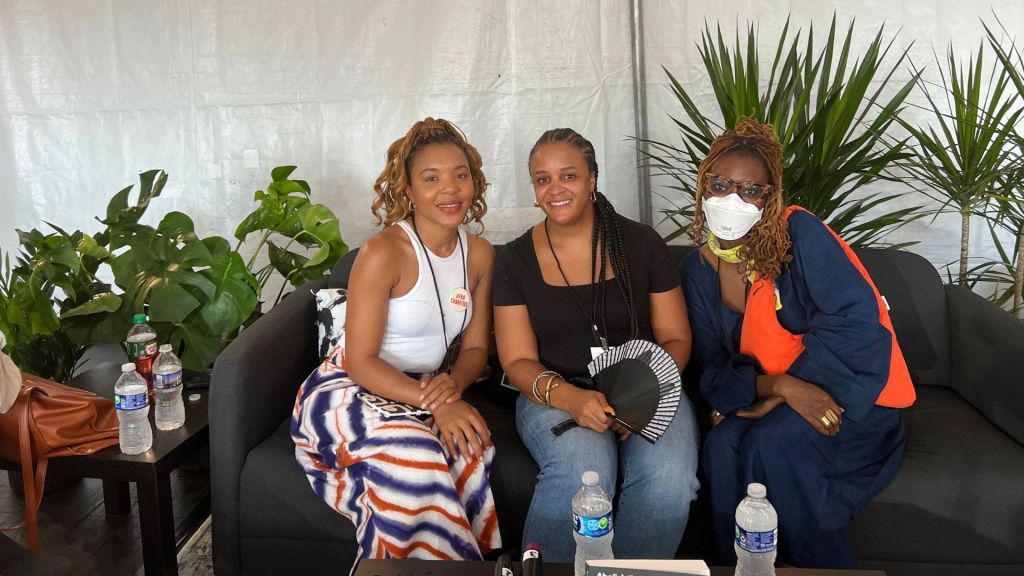By Ariyana Griffin
AFRO Staff Writer
agriffin@afro.com
The Baltimore Book Festival, a top annual event for Charm City book lovers, celebrated its 25-year anniversary Sept. 28-29. More than just a literary event, the festival is a proud celebration of authors, small businesses, cultural preservation and fostering community from members across Baltimore.

The Waverly community hosted the two-day festival, home to multiple bookshops, including Red Emma’s, Normals Books and Records, Urban Reads and The Book Thing of Baltimore. Over 100 authors and guests joined the festival to engage in conversations about book bans, Black history, education and more, making it an inclusive event welcoming to all.
Lisa Snowden, co-founder and editor-in-chief of the Baltimore Beat, discussed “Preserving History: How the Black Press Safeguards the Past,” in collaboration with members of the Afro Charities team. Writer Bry Reed moderated the conversation, which was led by Snowden, Deyane Moses, director of programs and partnerships for Afro Charities, and Bilphena Yahwon, processing fellow at Afro Charities.
According to The Pew Research Center, only “about half of Black Americans (51 percent) say they are very or extremely informed about the history of Black people in the U.S. Nearly four-in-ten (37 percent) say they are somewhat informed, while 11 percent say they are a little or not at all informed.” Furthermore, research found that most Black adults learned history from friends and family.
Afro Charities, a key player in preserving Black history nationally, boasts an archival collection of over 130 years of history from the AFRO-American Newspapers and beyond. This collection is a vital resource for those interested in learning about history, and the organization has made it its mission to make it accessible.
Moses shared that the AFRO was “a major outlet for civil rights leaders and everyday people to talk about the good news as well as the things that were happening in their communities.”
“The AFRO is so, so critical for that narrative- they’ve been doing that work and championing that work since 1892, when the paper was founded,” she said.
The AFRO archives have been part of several historic contributions including shows, museums, movies, and more. She shared that they can also be a tool for genealogical research, allowing people to track their family and history.
“I want to make sure everyone out there knows that we are a resource that is accessible right now,” she said, adding that history is very “cyclical,” and it is often repeated, as can be found in the archives.
Snowden spoke on how the work of telling Black stories should be handled with care. She warned of the dangers of constantly turning out stories and moving on because sometimes stories, especially with minorities, need detailed care.
“If you’re turning stuff out, you’re not treating it with care—you’re not treating it with respect,” said Snowden. She shared that they can’t do all the stories in Baltimore due to having a small team. However, she expressed that they can ” do a few things and do them really well—approaching it with dedication.”
Snowden shared that they have already taken measures to preserve and digitize the legacy of the paper to archive the stories they have shared. She stresses the importance of printed media in the archival process – they look forward to archiving the paper more physically.
Yahwon revealed that archiving is not easy and requires patience, hard work, attention to detail and effort. In the past, the archives weren’t as accessible to the open public.
“You couldn’t just go on ProQuest or come to Afro Charities to get a tour out of the blue; people had to do that work,” Yahwon said. “I think that when we get people more familiar with the labor of archiving, they will be able to understand more how they’re able to get online in search of words – that it is somebody who has to put in every single thing.”
She came to this work after yearning for knowledge about her roots in Liberia, where she is originally from, but moved to America due to the Liberian Civil War in 2001. Through her research, she found a lot of information about Liberia that was documented through the AFRO and reached out to Afro Charities. Now, as a processing fellow, Yahwon is able to give insight to how the AFRO reported on issues in other countries, via local contacts and on-the-ground reporting.
To learn more about Afro Charities and their work, visit Afrocharities.com.
The post Members of Afro Charities team speak on preserving history appeared first on AFRO American Newspapers.











